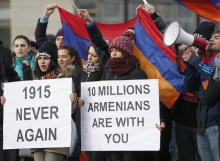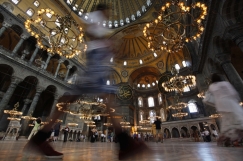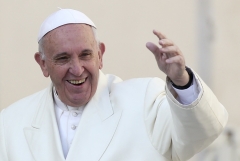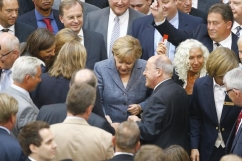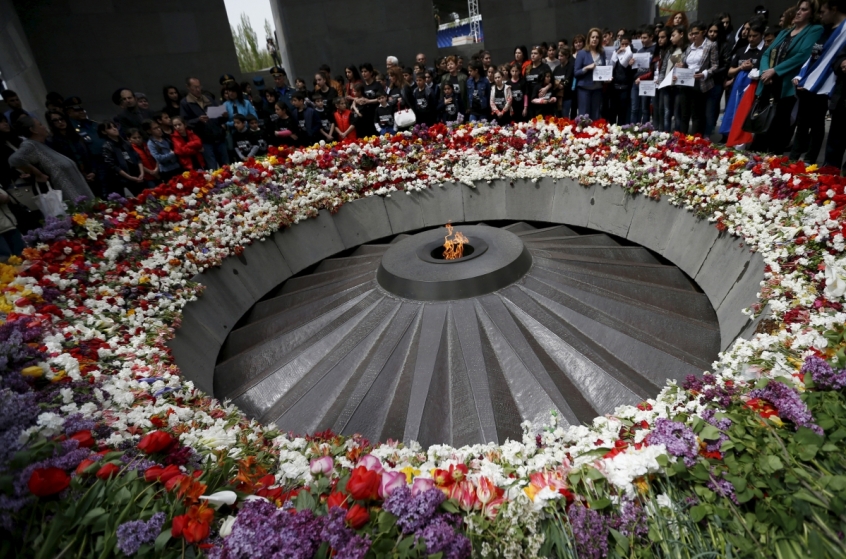
Germany is set to vote on branding as genocide the killing of up to 1.5 million Armenians by the Turks a century ago.
It's a diplomatic nightmare for Germany, and for Europe. Turkey has agreed to stop the flow of migrants across the Mediterranean from its territory and take back from Greece any who succeed in crossing. There are questions over whether it will work and whether it's even legal, but it's exacted a high price for doing so, including visa-free travel for its citizens. It can do so because it holds all the cards: the migration crisis has shaken Europe to its foundations.
But Turkey's President Recep Tayyip Erdogan, unpredictable and authoritarian, is quite capable of taking the huff about this. One of his recurring complaints about Europe is that it's a Christian club, profoundly lukewarm about Turkey's application to join it. A resolution in Germany pinning guilt for the genocide firmly on Turkey might just be the last straw.
And just to be clear: Turkey did commit genocide.
Article Two of the UN Convention on Genocide of December 1948 describes genocide as carrying out acts intended "to destroy, in whole or in part, a national, ethnic, racial or religious group".
In 1915-16, hundreds of thousands of Armenians were murdered in their homes or in camps in circumstances of extreme brutality. Women were gang-raped, set on fire and thrown over cliffs. Men had horseshoes nailed to their feet. They were sent on death marches across the desert where they starved or died of thirst or were beaten to death when they fell behind.
Armenians claim 1.5 million people died, while the International Association of Genocide Scholars says it was "more than a milion". Turkey says it was only 300,000. It has consistently denied, in the face of all the evidence, that there was a systematic programme of extermination. It has, subtly and not-so subtly, sought to eradicate all traces of the Armenians from the places they once lived.
Questioning the official account of the genocide in Turkey is risky. Turkey's most internationally famous novelist, Orhan Pamuk, made an off-the-cuff remark to a Swiss interviewer in 2005. Discussing freedom of expression in Turkey, he said that "a million Armenians and 30,000 Kurds were killed in this country and I'm the only one who dares to talk about it". The backlash was instantaneous, even though he didn't use the banned word 'genocide'. The press attacked him fiercely, he received death threats and had to go into hiding. Pamuk was threatened with prosecution, though the charges were dropped.
Journalist Hrant Dink, who also wrote about the genocide, was shot dead in January 2007 by teenage ultra-nationalist, Ogun Samast, who was jailed for 23 years in July 2011 for the crime.
Even Pope Francis has to walk on diplomatic eggshells. Last year he referred to the killings as "the first genocide of the 20th century", resulting in the recall of Turkey's ambassador to the Vatican, and his visit to Armenia next month will be another flashpoint.
Britain has declined to describe the events as genocide as it regards good relations with Turkey as more important.
But here's the thing. If Germany had refused to recognise its responsibility for the Holocaust, no government would accept that it had a right to a place at the European table. It would still be an international pariah. In fact, it has unshrinkingly and painfully acknowledged what it did in a way that Turkey never has.
Turkey's guilt is unquestionable. It owes it to the few survivors still living and to the descendents of those who escaped to acknowledge it. It owes it to history, too; and it owes If it does not, it can never be fully accepted into the community of Europe, whether it joins the EU or not.
In spite of the refugee crisis, in spite of the horrors unfolding on the other side of its border with Syria, in spite of the authoritarian crackdown on dissent and a renewed offensive against Turkish minority – all factors that would lead many diplomats to say that the less this boat is rocked the better – Germany's parliament is doing a good thing. Whether it will sway Erdogan himself, or Turkish public opinion, is a different question. But the truth must be told.










